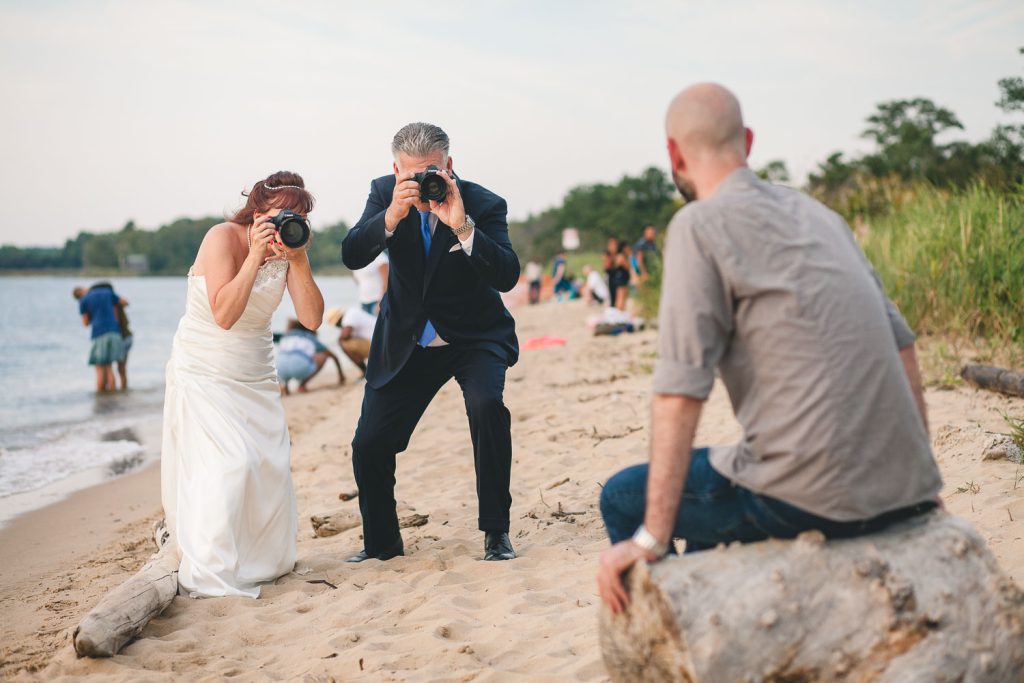I think some people choose to be photographers as a kind of insurance policy. When we’re always behind the camera, the chances of having one pointed at us go way down. The person with the biggest camera pretty much always takes the photo, and there is not usually more than one person with big cameras around. So as the photographer, we pretty much always have an excuse not to be in the photo. Lucky us, right?
Well, no not really. Photographers have plenty of different reasons for wanting to avoid the other side of the camera. But I’m willing to bet most of those reasons have something to do with feelings of self-consciousness. Up until a few years ago, I know that’s what it was for me. Now I’m a much more confident person in front of the camera, and a much more empathetic person behind it. Let me share with you how that happened, and why it matters to you.
Several years ago, I began going out to shoot with Felipe, the only other photographer on my team at the time. Where traditionally photographers going out to shoot together find a subject and take turns shooting, we decided to use each other as subjects. The idea was to try and learn to connect with the range of feelings our subjects felt during their shoot, and what it felt like to receive various instructions from the photographer.
Almost immediately those feelings of self-consciousness rose to the top. I have a big chin. I have a big nose. I’m balding. Those jeans are not flattering. I should close the top button. It was next to impossible to take photos of each other that we actually liked. But we kept doing it. That was the point. What did we need to learn as photographers about our subject’s experience that would allow us to create images that they would love? It turns out, the thing we really took from those exercises was a nuanced empathy towards those in front of our camera.
Just recently, we were working with a young woman, Lana, on some personality portraits. Before her session, Lana voiced that she didn’t want us to think she was bad at taking photos, and was afraid some aspects of her appearance would make her hard to photograph and that we would feel frustrated with her for it. I was a little taken aback because no client had ever stated so succinctly what their hesitation was. I shared with her the exercises Felipe and I had gone through and she booked her session on my promise to be patient with her. By the time her session was over, she was not feeling so self-conscious anymore.
Here’s what we taught Lana:
We’re not “judging” you
When we get out there to shoot, we’re there to make you look and feel great. To do that, we have to make certain kinds of judgements, but those aren’t the kinds of judgements you hate. They’re the kinds of judgements we have to make to get what we want from the session. For example, if you’re carrying some extra weight, we have to acknowledge that to ourselves, and that is a kind of judgement. But it does not bearing on our desire and goal to display your beauty, individuality and uniqueness. We don’t see you as somehow less deserving of being portrayed in your best light because of something you might see as a flaw in yourself. We see it as just one of many qualities of your physical form, and only a fraction of who you really are.
Almost no one is “good” at taking pictures
There is only a small group of people who have been professionally trained to be great at being in photos. We call them models. There’s a lot more to it than just being a pretty person. So many people are afraid that their photographer will hate working with them because they don’t know how to do what models do. But the truth is, one of the photographer’s jobs is to help you work with them. Lana imagined she would be on the spot to come up with poses and make herself look good, but that wasn’t the case. Your photographer will guide you into looking your best.
You will feel less self-conscious when it’s over
Your photographer isn’t going to rush you. Your photographer is going to be patient, and explain what they’re working on. They’ll give you incremental feedback, and help you know what to do on a granular level if necessary. As you get more comfortable and open up, your photographer will notice and give you as much of the reins as you want. Sometimes by the end of the session, our subject that was once very self-conscious, is now tossing out their own posing suggestions and suddenly engaging in a collaboration with their photographer.
being photographed can help you get over feeling self-conscious
Ironically, feeling self-conscious is often more limiting than the thing you’re feeling self-conscious about. It can make it hard to connect with people and meet your goals. Maybe you’re satisfied staying in the shadows, feeling self-conscious. That really is okay if you’re happy and getting everything you want out of life. But if you’re avoiding being seen, it’s hard to say what you might be missing out on. Maybe something really special. We don’t presume to say that everyone who identifies with feelings self-consciousness needs to change those feelings, but many of those people do want them to change.
I can tell you from first hand experience, that if you want to get over feelings of self-consciousness, working with a photographer is a really good place to start. You have to feel uncomfortable for a little bit, but your photographer’s patience, or calm, or enthusiasm will relax you and you’ll start to feel better about yourself. This is a healthy process to go through. But additionally, after the shoot, you’ll get back images that reflect excellent angles on your appearance and personality, reenforcing the positive experience. I myself am considerably more comfortable in general now, than I was before I intentionally stepped in front of the camera.
If you’ve been letting self-conscious voice in your head stop you from updating your headshots, or doing family photos, give us a call right away. We can help you.

